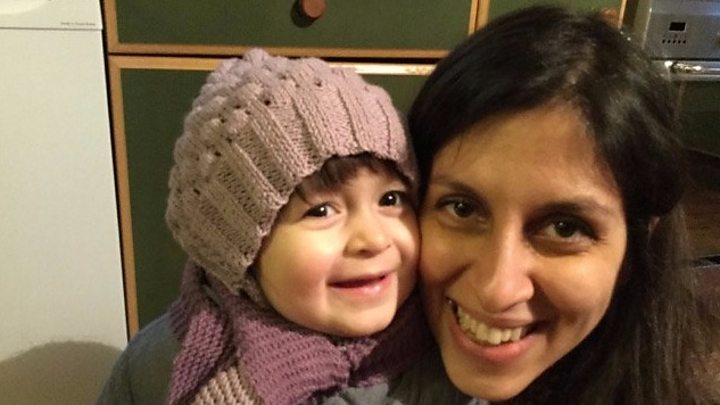This post was originally published on this site
A British-Australian woman and her Australian boyfriend have said they are “extremely happy and relieved” after their release from an Iranian jail.
Travel bloggers Jolie King and Mark Firkin were detained in Tehran earlier this year for reportedly flying a drone without a permit while on a trip across Asia.
A second British-Australian, Kylie Moore-Gilbert, is still in prison.
Australia’s foreign minister said talks to secure her release were ongoing.
Marise Payne told reporters that it was “with some enormous relief” that she could announce Jolie King and Mark Firkin “have been released and returned”.
In a statement, the couple said: “We are extremely happy and relieved to be safely back in Australia with those we love.
“While the past few months have been very difficult, we know it has also been tough for those back home who have been worried for us.”
They said they hoped to get back to their “normal lives” and asked for privacy, raising concerns from other detainees that “intense media coverage” may not be helping efforts to bring them home.
The pair were detained after entering Iran as part of a major trip across Asia to the UK – they were blogging about it for thousands of followers on social media.
Meanwhile, Australia released an Iranian student, Reza Dehbashi Kivi, back to Tehran, according to the country’s semi-official news agency Fars.
How did Australia free its ‘diplomatic hostages’?
By James Landale, BBC diplomatic correspondent
The release of Jolie King and Mark Firkin from detention in Iran raises an obvious question: why has Australia been successful in getting their detainees home while Britain has not?
Nazanin Zaghari-Ratcliffe remains languishing in Evin prison. The answer is ultimately one only the Iranian authorities can provide.
It is not for want of trying: her husband, Richard, and the British government have pushed hard for her release, trying to embarrass Tehran with a vocal, public campaign. But the cases are different.
Ms King is an Australian-British dual national, whereas Mrs Zaghari-Ratcliffe is a British-Iranian national, a distinction not accepted by Iran.
The accusations could perhaps be considered by the Iranian judiciary to be of a different order: flying a drone without a permit compared to spying.
Australia does not have the same historic baggage with Iran, which repeatedly attacks Britain for what Tehran see as its alleged colonial interference.
But, most of all, Mrs Zaghari-Ratcliffe is considered by Iran to be a bigger pawn on the diplomatic chess board.

Media playback is unsupported on your device
The UK government accuses Iran of taking diplomatic hostages as part of its attempt to resist economic and military pressure from the United States and its allies over its nuclear and missile programmes.
The British government does have something Iran wants; not the release of an Iranian from British detention, but the money Tehran is owed for some tanks that were not delivered after the revolution in 1979.
But the UK will not pay that bill until a way around the sanctions can be found.
The truth is that Mrs Zaghari-Ratcliffe is tragically caught up in bigger geopolitical machinations than the Australian travellers.
Mr Dehbashi Kivi had been arrested in September 2018 for allegedly sending American-made military equipment to Iran.
Australia’s Attorney General Christian Porter declined to comment on the reasons for the decision, saying it could “diminish our government’s capacity to deal with future matters of this type in Australia’s best interests”.
According to Australia’s foreign minister Marisa Payne, Ms Moore-Gilbert remains in prison in Tehran, where she has been for almost a year having reportedly been given a 10-year sentence.
“Very long-term negotiations” were taking place to secure the release of the Cambridge-educated academic, Ms Payne added.
The two British-Australian women were believed to be the first British passport holders without dual Iranian nationality to be held in the country in recent years.
Their detention echoes that of British-Iranian mother Nazanin Zaghari-Ratcliffe, who has been imprisoned since 2016 after being convicted of spying, which she denies.
On Friday it was announced that Mrs Zaghari-Ratcliffe would allow her daughter Gabriella, five, to return to the UK to begin schooling.
The mother and daughter were said by family to have travelled together to Iran to visit relatives before she was detained.
Who are the other Britons detained in Iran?
As well as Nazanin Zaghari-Ratcliffe, a number of other dual UK-Iranian citizens are being detained in Iran.
Iran does not recognise dual nationality, and there are no exact figures on the numbers of dual nationals in custody.
But they do include businessman and wildlife conservationist Morad Tahbaz, who also has US citizenship and was arrested in a crackdown on environmental activists in January 2018, and Kameel Ahmady, a social anthropologist, who has been in custody since August.
Anousheh Ashouri, a British-Iranian dual national, was sentenced to 10 years in prison by a court in Tehran after being convicted of spying for Israel.
Aras Amiri, 33, a UK resident who works for the British Council in London, was held in March 2018 on a visit to her unwell grandmother. This year Ms Amiri lost an appeal against a jail term for spying, and her British fiancé, James Tyson, told the BBC she was being used as a “bargaining chip” by Iran’s government.
